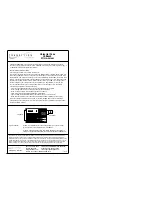
MiniSonde MPL9-33
High mechanical stress, high ambient temperatures or immersion into liquids
can cause leakage, fire or explosions of the batteries.
Precautions: Protect the batteries from mechanical influences and high ambient
temperatures. Do not drop or immerse batteries into liquids.
OPERATING THE DEVICE
When the battery is inserted and the battery compartment attached, the
MiniSonde will start emitting a 33 kHz Signal. The location of the MPL9-33 can now
be detected with a receiver that operates at the same frequency, such as the
Vesala CL43. Before use, ensure the MiniSonde is fully functional by locating the
signal with a corresponding receiver. Refer to the user manual of the receiver on
pinpointing the location of the MiniSonde.
You can attach the MiniSonde to a duct rod, cable rodder, snake rod, push or pull
rod using the female M6 thread at the end of the battery compartment. An O-ring
provides added grip when tightening.
When using the device for blowing with compressed air, always blow with battery
compartment end first. Refer to the user manual of the blowing unit and follow safe
work practices.
Use of compressed air can lead to the MiniSonde exiting the duct at great
speed.
Precaution: Always use a catcher at the end of the Duct. If changing the direction
of the blowing due to the device getting stuck, remember to move the catcher to
the other end of the duct. Do not blow the MiniSonde with pressure exceeding 6
bars. Always use safety goggles, when using the MPL9-33 with compressed air.
MAINTENANCE
CLEANING
Clean with clean soft cloth. Do not use abrasive agents or solvents for cleaning.
Take care to avoid dirt getting into the unit. Regularly inspect O-ring and replace if
damaged. If water gets into the battery compartment, allow it to dry at room
temperature.
STORAGE
Store inside storage box. Respect the temperature limits stated in the technical
data
when storing the device. Always remove the batteries from the product
during storage to avoid leakage. After a long time of storage, check the function
of the device.
2 (6)


































